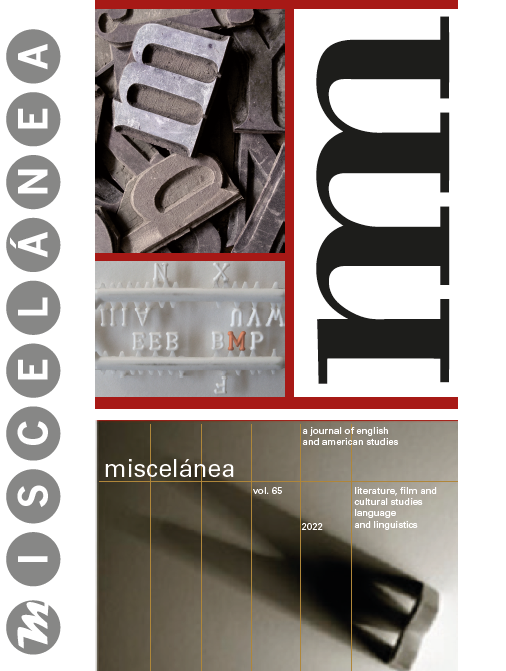Brideshead Revisited, de Evelyn Waugh: Lugares de Memoria y Tradición
DOI:
https://doi.org/10.26754/ojs_misc/mj.20226848Palabras clave:
Brideshead Revisited, lugares de memoria, comunidades de memoria, tradición, catolicismo inglésResumen
En el presente artículo, analizaré dos nociones teóricas relacionadas con el espacio, a saber, la idea de lugar de memoria de Pierre Nora y el pensamiento de Gaston Bachelard sobre el espacio y la casa, en su aplicación a Brideshead Revisited (1945), de Evelyn Waugh. Basaré mi análisis en el valor simbólico de la gran mansión de campo inglesa en relación con la aristocracia y las clases altas de la Inglaterra de entreguerras según es descrita en esta novela: esto es, como un lugar de memoria. Haré esto desde la perspectiva de tres personajes: Charles Ryder, el narrador en primera persona, Lord Sebastian Flyte, amigo íntimo de Ryder, y Lord Marchmain, padre de Sebastian y causante del rápido e inesperado final de la novela mediante su conversión, en su lecho de muerte, al credo de su familia: el catolicismo. Llegaré a una conclusión que vincula el declive de los ideales aristocráticos y cristianos con la desaparición de comunidades y tradiciones de memoria tras de la Segunda Guerra Mundial.
Descargas
Citas
Augustine of Hippo. (AD 397-400) 2001. The Confessions of Saint Augustine. Trans. R. Warner. New York and London: New American Library.
Bachelard, Gaston. 1994. The Poetics of Space. Trans. M. Jolas. Boston, MA: Beacon Press.
Berberich, Christine. 2007. The Image of the English Gentleman in Twentieth-Century Literature: Englishness and Nostalgia. Aldershot and Burlington, VT: Ashgate.
Cannadine, David. 1999. The Decline and Fall of the British Aristocracy. New York: Vintage.
Carey, John. 1992. The Intellectuals and the Masses: Pride and Prejudice among the Literary Intelligentsia. London: Faber and Faber.
Clinton-Baddeley, V.C. (1945) 1984. “Spectator”. In Stannard, Martin (ed.): 237-238.
Coffey, Laura. 2006. “Evelyn Waugh’s Country House Trinity: Memory, History and Catholicism in Brideshead Revisited”. Literature and History 15 (1): 59-73. DOI: https://doi.org/10.7227/LH.15.1.4
Davis, Robert M. 1992. “Imagined Space in Brideshead Revisited”. In Blayac, Alain (ed.) Evelyn Waugh: New Directions. Basingstoke, Hampshire: Macmillan: 22-34.
Deslandes, Paul R. 2005. Oxbridge Men: British Masculinity and the Undergraduate Experience, 1850-1920. Bloomington and Indianapolis, IN: Indiana U.P.
Ferrall, Charles and Dougal McNeill. 2015. Writing the 1926 General Strike: Literature, Culture, Politics. Cambridge and New York: Cambridge U.P. DOI: https://doi.org/10.1017/CBO9781316163771
Hastings, Selina. 1994. Evelyn Waugh: A Biography. London: Minerva.
Heath, Jeffrey. 1982. The Picturesque Prison: Evelyn Waugh and his Writing. Kingston and Montreal: McGill-Queen’s U.P.
Kermode, Frank. (1960) 1984. “Mr Waugh’s Cities” In Stannard, Martin (ed.): 279-287.
McKibbin, Ross. 1998. Classes and Cultures: England 1918-1951.Oxford: Oxford U.P.
Moore, Barrington Jr. 1973. Social Origins of Dictatorship and Democracy: Lord and Peasant in the Making of the Modern World. Harmondsworth, Middlesex: Penguin.
Nolte, Ernst. 1969. Three Faces of Fascism: Action Française, Italian Fascism, National Socialism. Trans. L. Vennewitz. New York and Toronto: Mentor Books, The New American Library.
Nora, Pierre. (1984) 2008. “Entre memoria e historia: La problemática de los lugares”. Pierre Nora en Les lieux de mémoire. Trans. L. Montello. Montevideo: Trilce: 19-39.
Pryce-Jones, David. 1960. “Time and Tide”. In Stannard, Martin (ed.): 272-76.
Raven, James. 2015. “Introduction”. In Raven, James (ed.) Lost Mansions: Essays on the Destruction of the Country House. Houndmills and New York: Palgrave Macmillan: 1-21. DOI: https://doi.org/10.1057/9781137520777
Rothstein, David. 1993. “Brideshead Revisited and the Modern Historicization of Memory”. Studies in the Novel 25 (3): 318-331.
Slater, Anne Pasternak. 2016. Evelyn Waugh. Tavistock, Devon: Northcote House.
Słyszewska, Aleksandra. 2017. “Religion and the Nursery: Evelyn Waugh’s Brideshead Revisited”. Beyond Philology 14 (3): 201-217.
Stannard, Martin. (ed.) 1984. Evelyn Waugh: The Critical Heritage. London and New York: Routledge.
Su, John. 2005. Ethics and Nostalgia in the Contemporary Novel. Cambridge: Cambridge U.P.
Terentowicz-Fotyga, Urszula. 2015. Dreams, Nightmares and Empty Signifiers: The English Country House in the Contemporary Novel. Frankfurt am Main: Peter Lang.
Waugh, Evelyn. 1945. Brideshead Revisited: The Sacred and Profane Memories of Captain Charles Ryder. Boston: Little, Brown.
Waugh, Evelyn. (1960) 1962. “Preface”. Brideshead Revisited: The Sacred and Profane Memories of Captain Charles Ryder. London and New York: Penguin: ix-x.
White, Laura. 2006. “The Rejection of Beauty in Waugh’s Brideshead Revisited”. Renascence: Essays on Values in Literature 58 (3): 180-194. DOI: https://doi.org/10.5840/renascence200658314
Williams, Michael E. 1996. “Campion and the English Continental Seminaries”. In McCoog, Tomas S.J. (ed.) The Reckoned Expense: Edmund Campion and the Early English Jesuits: Essays in Celebration of the First Centenary of Campion Hall, Oxford (1896-1996). Woodbridge, Suffolk: Boydell Press: 285-299.
Williams, Raymond. 1973. “Base and Superstructure in Marxist Cultural Theory”. New Left Review 1 (82): 3-16.
Wykes, David. 1999. Evelyn Waugh: A Literary Life. Basingstoke: Macmillan.
Descargas
Publicado
Cómo citar
Número
Sección
Licencia
Derechos de autor 2022 Miscelánea: A Journal of English and American Studies

Esta obra está bajo una licencia internacional Creative Commons Atribución-NoComercial 4.0.


